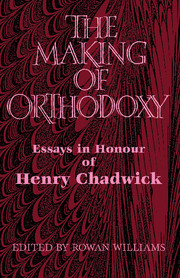Book contents
- Frontmatter
- Contents
- Preface
- List of abbreviations
- Bibliography of Henry Chadwick
- Does it make sense to speak of pre-Nicene orthodoxy?
- ‘And I have other sheep’ – John 10:16
- Reason and the rule of faith in the second century ad
- Adam in Origen
- Panegyric, history and hagiography in Eusebius' Life of Constantine
- Matthew 28:19, Eusebius, and the lex orandi
- The achievement of orthodoxy in the fourth century ad
- Eunomius: hair-splitting dialectician or defender of the accessibility of salvation?
- Some sources used in the De Trinitate ascribed to Didymus the Blind
- The rhetorical schools and their influence on patristic exegesis
- Pelagianism in the East
- The legacy of Pelagius: orthodoxy, heresy and conciliation
- Augustine and millenarianism
- Divine simplicity as a problem for orthodoxy
- The origins of monasticism
- Artistic idiom and doctrinal development
- Index of modern names
- Index of ancient and medieval names
- Index of sources
‘And I have other sheep’ – John 10:16
Published online by Cambridge University Press: 08 October 2009
- Frontmatter
- Contents
- Preface
- List of abbreviations
- Bibliography of Henry Chadwick
- Does it make sense to speak of pre-Nicene orthodoxy?
- ‘And I have other sheep’ – John 10:16
- Reason and the rule of faith in the second century ad
- Adam in Origen
- Panegyric, history and hagiography in Eusebius' Life of Constantine
- Matthew 28:19, Eusebius, and the lex orandi
- The achievement of orthodoxy in the fourth century ad
- Eunomius: hair-splitting dialectician or defender of the accessibility of salvation?
- Some sources used in the De Trinitate ascribed to Didymus the Blind
- The rhetorical schools and their influence on patristic exegesis
- Pelagianism in the East
- The legacy of Pelagius: orthodoxy, heresy and conciliation
- Augustine and millenarianism
- Divine simplicity as a problem for orthodoxy
- The origins of monasticism
- Artistic idiom and doctrinal development
- Index of modern names
- Index of ancient and medieval names
- Index of sources
Summary
Patristic scholarship has always been one of the great strengths of the Anglican Communion. It has been represented by a long succession of able scholars, including J. B. Lightfoot (d. 1889), B. F. Westcott and F. J. Hort, Benjamin Kidd and G. L. Prestige. It has never been subjected to the constraints that beset Roman Catholic patristic scholars on the continent at the time of the imposition of the anti-Modernist oath by the Papacy in 1910. The critical study of the early Fathers has flourished in the United Kingdom as one of the hallmarks of ‘sound learning’ in the church, and in particular, the four-yearly patristic conferences at Oxford initiated by F. L. Cross in 1951 remain a memorial to the contribution by scholars of British universities in that field. For more than forty years Henry Chadwick has represented the outstanding quality of their achievement.
Patristics, however, are by definition concerned largely with the literary study of the orthodox tradition of early Christianity. The Fathers were educated men, belonging to the relatively small cultural élite that has left its ideas for posterity. They were conscious, also, of belonging to a tradition of Christian teaching that was the sole truth, and they were concerned to defend its message against heresies, false interpretations, and misunderstandings. Their vast output of works expounding and defending the orthodox position as defined by the precedent of tradition reinforced by church councils, and their commentaries on every book of the Bible fill the columns of Migne's Patrologia.
- Type
- Chapter
- Information
- The Making of OrthodoxyEssays in Honour of Henry Chadwick, pp. 24 - 39Publisher: Cambridge University PressPrint publication year: 1989
- 2
- Cited by



